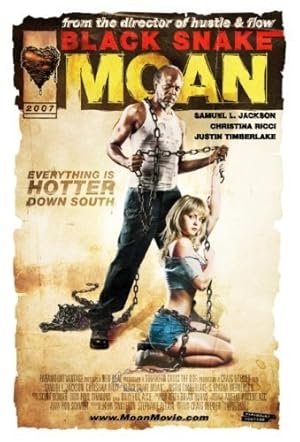Black Snake Moan
| 2006Directed by: Craig Brewer
Main Plot
Black Snake Moan follows the story of Rae, a troubled young woman who struggles with her tumultuous past and self-destructive behavior. After a series of reckless actions, she is found by Lazarus, a deeply religious man who is grappling with his own personal demons. Lazarus takes Rae into his home with the intention of helping her find redemption and healing. He chains her in his home as a means to protect her from herself and to confront her inner turmoil. As the two form an unusual bond, they navigate themes of love, pain, and the quest for freedom. The film explores the complexities of their relationship against the backdrop of the rural South, highlighting the struggles of addiction, trauma, and the search for salvation. Through their interactions, both characters confront their pasts and attempt to forge a path toward recovery and understanding.
Characters
- Christina Ricci plays Rae, a troubled young woman battling personal demons and seeking redemption, who forms an unlikely bond with a deeply religious farmer seeking to reform her.
- Samuel L. Jackson plays Lazarus, a deeply religious farmer who seeks to cure a troubled woman of her sinful behavior through unconventional and controversial methods.
- Justin Timberlake plays Ronnie, a nervous young soldier. His character is the boyfriend of Rae, central to her emotional turmoil and redemption arc.
Ending Explained
In the ending of Black Snake Moan, the central conflict reaches a resolution as the characters confront their personal demons and seek redemption. After a tumultuous journey, Rae, who has been struggling with her tumultuous past and self-destructive behavior, finds herself at a crossroads. Lazarus, who has been holding her captive in an attempt to "cure" her, ultimately realizes that his possessive approach is not the answer. In a pivotal moment, Rae decides to take control of her life, symbolizing her growth and newfound strength. She confronts her past and the trauma that has haunted her, leading to a cathartic release. Lazarus, too, faces his own vulnerabilities and learns to let go of his controlling nature. The film culminates in a poignant scene where Rae embraces her freedom, leaving behind the chains that once bound her. The ending connects to the overall narrative by emphasizing themes of healing, forgiveness, and the complexity of human relationships. It highlights the importance of self-acceptance and the power of personal transformation, allowing both characters to move forward with a deeper understanding of themselves and each other. This resolution reinforces the film's exploration of love, pain, and redemption.
